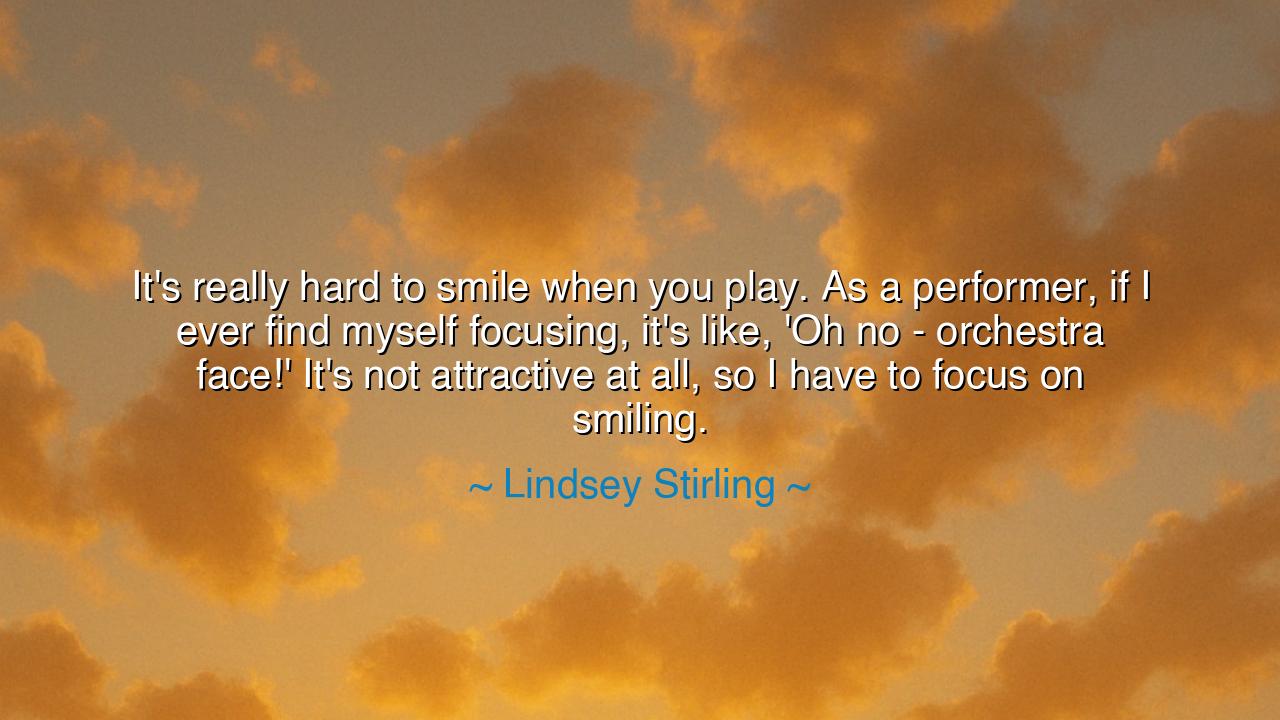
It's really hard to smile when you play. As a performer, if I
It's really hard to smile when you play. As a performer, if I ever find myself focusing, it's like, 'Oh no - orchestra face!' It's not attractive at all, so I have to focus on smiling.






Hear now, O listener, the spirited words of Lindsey Stirling: “It’s really hard to smile when you play. As a performer, if I ever find myself focusing, it’s like, ‘Oh no – orchestra face!’ It’s not attractive at all, so I have to focus on smiling.” Though wrapped in humor, these words reveal an ancient tension—the battle between discipline and joy, between inward concentration and outward expression. They speak of the art not only of playing music but of embodying it, of showing the soul as well as the skill.
The meaning of this reflection is that performance is more than technical mastery; it is communication. To play perfectly yet wear the hardened mask of strain is to build a wall between artist and audience. But to smile, even while laboring, is to let the audience glimpse the joy and spirit behind the notes. Stirling knows that the role of the performer is not only to execute but to share, not only to focus inward but to radiate outward. The smile becomes an instrument as vital as the bow or the strings.
The origin of this wisdom lies in the oldest traditions of performance. In the temples of Greece, actors in tragedy wore masks to project emotion, but in comedy, the face itself was often enough to stir laughter. In India’s classical dance, the smile is as essential as the gesture, for it tells the story in harmony with the body’s movement. And in medieval courts, minstrels knew that a cheerful demeanor bound the hearts of nobles more tightly than the finest ballad. Always, the performer’s face was as much a message as the sound or step.
History provides shining examples. Think of Louis Armstrong, whose trumpet dazzled the world, but whose radiant smile became his truest signature. His playing was brilliant, but it was his expression—his openness, his joy—that made audiences feel they were not merely listening, but sharing in his delight. Contrast this with the stern “orchestra face” Stirling mentions, where deep focus may convey technical excellence but risks losing the warmth of human connection. Thus, her words echo a timeless truth: art that does not reach the heart is incomplete.
Yet this teaching is not only about the stage. In life itself, we often find ourselves so consumed by focus, by duty, by the mechanics of our labor, that we forget the power of smiling. We become like players locked in technical mastery but cut off from the audience of our families, our friends, our communities. Stirling’s struggle reminds us: to live fully is to let joy shine outward, even when effort and strain press hard upon us.
Practically, this lesson calls us to mindfulness. In your work, whether artistic or ordinary, pause to remember the smile. It does not diminish your focus; it enhances your connection. Train yourself, as Stirling trains herself, to replace the mask of strain with the light of presence. For the performer’s job is not only to succeed, but to uplift. And each of us, in our own sphere, is a performer of life, called to bring warmth as well as skill.
So, O listener, carry this wisdom: do not let the weight of concentration rob you of expression. Strive, but also smile. Labor, but also radiate joy. For it is not only the music of your actions that others will remember, but the face with which you offered it. In this, you honor both the craft and the heart, blending discipline with delight, and turning your every effort into an act of shared humanity.
Thus the teaching endures: the smile is as important as the skill, the warmth as important as the work. To master both is the path of the true artist—and the true soul.






AAdministratorAdministrator
Welcome, honored guests. Please leave a comment, we will respond soon